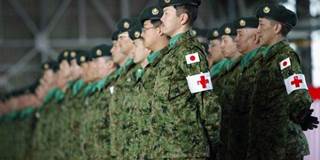Domestic opposition to Japanese Prime Minister Shinzo Abe's effort to alter Japan's defense posture, though broad, does not run very deep. Voters, it seems, are less concerned about the direction Abe is taking the country than about the need to turn around a moribund economy.
WASHINGTON, DC – In February, Japanese Prime Minister Shinzo Abe called on the National Diet to amend Article 9 of the country’s constitution, which renounces war as a means of settling disputes. Drafted by the United States after World War II, the constitution contains “some parts [that] do not fit into the current period,” Abe said. He is particularly concerned with the constitutional provision that prohibits Japan from maintaining “land, sea, and air forces,” arguing that it seems to be in direct contradiction with the existence of the country’s Self-Defense Forces.

WASHINGTON, DC – In February, Japanese Prime Minister Shinzo Abe called on the National Diet to amend Article 9 of the country’s constitution, which renounces war as a means of settling disputes. Drafted by the United States after World War II, the constitution contains “some parts [that] do not fit into the current period,” Abe said. He is particularly concerned with the constitutional provision that prohibits Japan from maintaining “land, sea, and air forces,” arguing that it seems to be in direct contradiction with the existence of the country’s Self-Defense Forces.